Washington, D.C. – In their eleventh annual holiday spending survey, the Consumer Federation of America (CFA) and the Credit Union National Association (CUNA) found that consumers report some improvement in their financial condition and intention to spend more this holiday season than the 2009 season.
More respondents to this recent survey (November 11-14) said their financial situation is better this year (23%) than last (19%), and far fewer said it was worse this year (30%) than last (36%). This reported improvement may help explain why more respondents said they would increase their holiday spending this year (10%) than last (8%), and fewer said they would decrease their spending this year (41%) than last (43%).
“While these results convince us that holiday spending will increase this year – elements of our survey also underline the fact many consumers continue to harbor significant concerns about the economy and their personal finances,” said Mike Schenk, CUNA senior economist. “Because of this we expect the increase in holiday spending this season to be modest – roughly half the 5% long-run average increase.”
The CFA/CUNA survey also indicated that consumers are making greater efforts, and having some success, managing their consumer and mortgage debt. When asked how they would most likely use most of a $5,000 windfall, nearly half (47%) said they would “pay down some debt.” This percentage is not only six percentage points higher than last year but is also higher than percentages for each of the ten previous years.
Moreover, fewer respondents reported that they are very concerned about meeting monthly credit card payments this year (10%) than last (12%), and far fewer said they were very concerned about meeting monthly payments on all types of debt this year (17%) than last (23%).
“Our survey provides further evidence, along with less borrowing and more saving, that consumers are trying to rebuild their balance sheets and are having some success doing so,” said Stephen Brobeck, CFA’s executive director.
The CFA-CUNA survey was conducted by Opinion Research Corporation, which interviewed by phone more than 1,000 representative adult Americans. The survey’s margin of error is plus or minus three percentage points.
Middle-Age Americans Report Unusual Degree of Concern
Americans between the ages of 45 and 54 reported an unusual degree of concern about their financial condition, as the data below indicate:

“It is interesting to note that Federal Reserve data separately reveals that households headed by those in this 45 to 54 age group are the most likely to be carrying debt loads,” noted CUNA’s Mike Schenk. “In all, 87% of those in this group carry debt, and they are much more likely than their peers in other age groups to hold both mortgage debt and to have credit card balances. “
Greater Concerns on Spending, Debt Among Lower-income Families
Not surprisingly, though, lower-income families (under $25,000) have even greater concerns. Thirty percent intend to spend much less than last year. Forty-four percent say their financial condition is worse. Fifty-six percent say they are concerned about meeting all debt payments.
And when asked how they would pay for an unexpected $5,000 emergency, far more lowerincome families said they would have to borrow it – 39% get a gift or loan from family or friend, 31% take out special loan, 17% put on credit card, 13% add to home equity loan – than taking money out of checking (19%) or savings (33%). (Respondents were permitted multiple responses on this question.)
Ideas for Keeping Holiday Debt Under Control
With more consumers putting their focus on paying down debt, CUNA and CFA suggest the following tips to avoid reversing course and getting deep into debt during the holidays. “With just a little planning, consumers can substantially reduce their holiday spending without sacrificing holiday quality,” said Brobeck.
Make Budget, and a List: Right now, decide how much you can afford to spend and stay within that budget. Staying within budget will be much easier if you make a price list of all gifts and other holiday items you plan to purchase. It’s easy to overlook extra expenses for holiday foods, party clothes, holiday décor and postage. Even if it’s a more general rather than detailed list, it will still help you avoid overspending and impulse buys.

